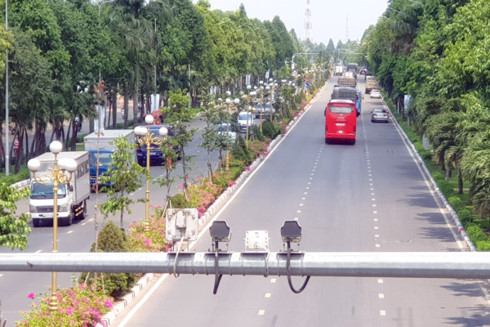
After Hanoi, Ho Chi Minh City, Da Nang, and Binh Duong, Dong Nai is the next locality selected to pilot a smart city development model through cooperation with major corporations.
After Hanoi, Ho Chi Minh City, Da Nang, and Binh Duong, Dong Nai is the next locality selected to pilot a smart city development model through cooperation with major corporations.
 |
| A traffic surveillance camera in Nguyen Ai Quoc Road, Dong Nai province. (Photo: baodongnai.com.vn) |
Huynh Quang Liem, Deputy Director General of the Vietnam Posts and Telecommunications Group (VNPT), said “The core foundation of a smart city is the connection of data, the Internet of Things, and all the data relating to e-administration. Ministries and sectors need to share data legally and transparently.”
By 2020 Vietnam aims to have three smart cities - Hanoi, Da Nang, and Ho Chi Minh City. Dong Nai, Binh Duong, Ba Ria-Vung Tau in the south, Bac Ninh, and Hai Phong in the north will be the followers.
Taking the lead in urbanization in Vietnam, Dong Nai has implemented several smart applications like bus tracking cameras, traffic surveillance cameras, traffic signal control systems, and convergence traffic control center. All are preparations for the building of a future smart metropolis.
Major Tran Trong Thuy of the Dong Nai provincial police force said the deployment of the automatic system is a big advance toward minimizing human resources working in the field.
“This is a modern technology that can automatically analyze and update data, as well as handle traffic violations at specific locations via cameras and other equipment,” said Thuy.
The establishment of automatic systems in education, waste water and pollution monitoring indicators has so far delivered positive results.
Since last year the Dong Nai health sector has piloted an IT program to manage personal medical records through apps and web platforms. The move has improved the management of medicine trading and preservation and personal medical records.
Dong Nai has created more than 3 million personal health records for local people. More than 80% of retail pharmacies and clinics in the province have been connected through a software. They have also participated in community health networks making it easier for the locals to look up medical services.Dr. Phan Huy Anh Vu, Director of the provincial Health Department, said that Dong Nai will apply IT to serve the residents, noting that this is a revolution of the medical sector.
Once we can grasp the opportunity, we will deliver a much better service to residents. It’s necessary to apply IT to reduce time for paper work and give doctors more time to serve the patients.”
Although Dong Nai has not officially participated in the smart city project, local departments and sectors have applied IT in a wide range of work. Information concerning land, planning, business registration, investment and social affairs are now available on the Internet. The banking, customs, and tax sectors have offered online services to make their operation more efficient and improve their services.



